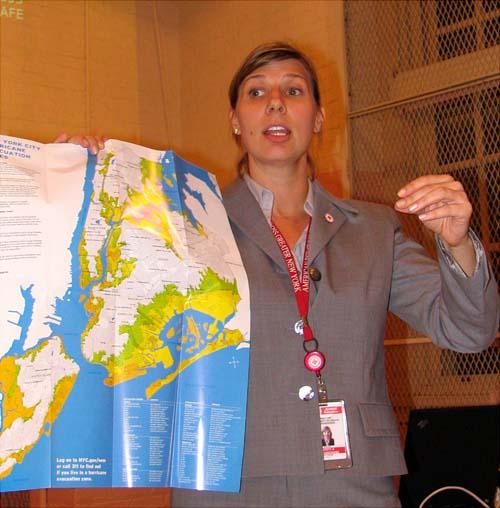In an emergency, being prepared can make all the difference.
That was the message delivered by Jeanine Pekkarinen, director of community outreach and preparedness for the American Red Cross, to members of the Nottingham Association.
Addressing the group gathered at Public School 193, Avenue L and Bedford Avenue, for their September meeting, Pekkarinen and Red Cross volunteer Barbara Hochberg went over the basics of preparedness.
Having a plan is a key to coping successfully with a disaster, said Hochberg. “If there’s a fire, you should know how to get out the building,” she told the group. “If you have family, make a meeting place outside your home. If you have an out-of-town relative, that is the person you all should call.”
Each family should practice its evacuation plan, said Pekkarinen, who also emphasized the importance of having a meeting place. “If you have a meeting place and everyone is there, you know everyone is safe,” she explained. “No one is going to go back in and risk his or her life.”
In addition, said Hochberg, every person should have a “go bag,” containing important items and documents – “supplies you need in case you have to leave.” These include a list of prescriptions, an extra pair of glasses, money, a change of clothes, and food and water. You should count on a gallon of water a day per person. “It’s very important,” Hochberg stressed, “to keep bottled water in the house.”
Every member of the family, including pets, should have a go bag, said Pekkarinen, and each one, she noted, “Should be tailored” to individual needs. A whistle is a good addition, she added, because it’s “a great way to call for help.”
Much of what you would pack into a go bag, added Pekkarinen, “you probably already have. You need to put them together.”
Also, said Hochberg, it’s a good idea to have a hand-cranked radio or a battery-operated radio at your bedside, as well as a flashlight.
Besides cordless phones, which need electricity to work, you should have a traditional phone that uses just the phone wiring to operate, said Pekkarinen. “In many cases, you are able to communicate with a land-line phone,” she stressed.
You should also have a written record of important phone numbers, she said. While, many people have such information on their cell phones or computers, you may not be able to access it if there’s a loss of electricity, Pekkarinen pointed out.
You should not necessarily head out at the first sign of an emergency, said Hochberg. If it’s possible, she emphasized, “the most advantageous thing is to shelter in place. Do not run to an evacuation center unless you are told to. If you have relatives out of town you can go to, go to them. The shelter is only a worst-case scenario.”
Common sense comes into play in preventing some disasters. For instance, many home fires are preventable, Pekkarinen said. “Be careful with candles,” she urged. “Keep them away from curtains and away from children.”
Also be cautious in your use of space heaters, Pekkarinen told her listeners. Make sure, she emphasized, that they are “not next to the wall or near anything that can burn.” Getting a new model that will shut off if it’s knocked over is also a good idea, Pekkarinen said.
If there is a fire, and you live in an apartment building, do not use the elevator to get out, said Hochberg. You should use the stairs, she stressed, noting that you should feel any door before you open it. If it’s cool, you can open it and go down the stairs. “Otherwise, go to the fire escape,” Hochberg added.
In 2007, there were 2,761 fires in New York City, said Pekkarinen. Of that number, Brooklyn – the most populous borough — had the most blazes, 951.
Pekkarinen also went over the reasons for being prepared. “Disasters happen everyday in New York City,” stressed Pekkarinen. “Eight to 10 times a day, the Red Cross is out there responding.”
While fires are the most common emergency, she noted, there are many other possible scenarios, ranging from a terrorist attack to a hurricane to a power outage. In each of these cases, Pekkarinen said, being prepared makes it easier for responders — most of whom are volunteers — to help those who have been affected.
“We know that people who are not prepared suffer more and take a lot longer to recover,” Pekkarinen stressed.





















